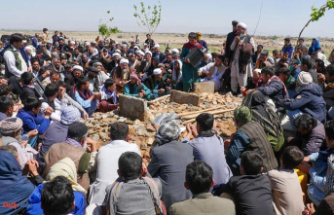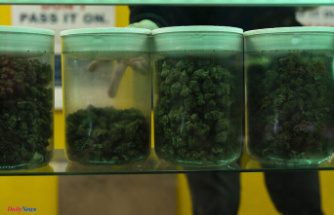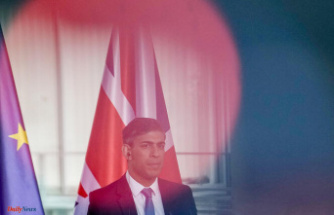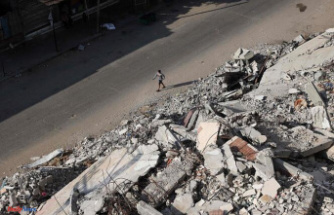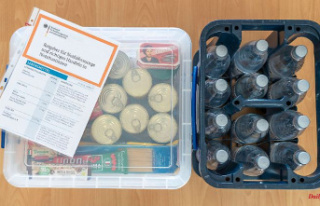Ben Becker is simply the ideal person to read the original narration of Francis Ford Coppola's cinematic masterpiece "Apocalypse Now" - not only because he has the name of the author Joseph Conrad tattooed on his skin, but also because he remembers the trip to " Heart of Darkness" more than anyone else seems to know. In the original story, which inspired Coppola's multiple Oscar-winning film about the Vietnam War, English captain Marlow joins a Belgian trading company's steamer in the Congo. His mission: to travel up the Black River, into the heart of the African continent, where the commercial agent Kurtz has created his own kingdom in which he plays God. In Becker's "Apocalypse", however, not only English colonialism and racism at the end of Queen Victoria's reign are accused, but also the entire European world, which since the 15th century has gained wealth and influence at the expense of exploitation, war, violence and flight . Ben Becker talks to ntv.de about his extraordinary, expressive interpretation.
ntv.de: Your reading - "The Apocalypse" is more relevant than ever. Isn't that frustrating? That humanity doesn't seem to learn anything. From no century, from no previous war, from no other catastrophe...
Ben Becker: It's extremely frustrating, for sure. It's not just Europe, it's apocalyptic all over the world. The apocalypse is global. This is sad and hurts me. She comes to our house every day now. At ntv.de you know what that means. 24/7 coverage from anywhere in the world, you can't resist it anymore. The floods in Pakistan wash right into the living room, as do the wars and famines. If I don't like it, I can set another program, but the information will reach me sooner or later. Information in this form did not exist before. Which doesn't mean that these catastrophes didn't happen. It raises so many questions...
Do you find this type of reporting bad, annoying or necessary?
I sometimes wonder how far I can take it. How far that can still take place in a skull. I'm already worried about youth, as the father of a daughter I wonder to what extent young people are inhibited and influenced by it. Whether it frightens, takes away joy or delights in the beauty of life that is actually given to us. The rug is being pulled out from under the feet of an entire generation.
Do you give your child a certain "Carpe Diem" spirit, just don't put it off until "later"?
I think the kids do that for themselves. I don't think dad has to come and say: "Have your fun!" I can help fund the fun (laughs) and of course give advice to go out and go and let them be.
You read from Joseph Conrad's "Heart of Darkness", it says: Every human being has his breaking point. When did you reach that point?
I don't know. The sentence is by Joseph Conrad. I believe that everyone has at least once been close to their personal breaking point or will come there. I don't know what happens when you cross it. Luckily that hasn't happened to me yet, even though I've often come close. But I always got the curve somehow. I don't know how broken you are then, how far you can still find a justification to continue. Because if you have experienced that, the breaking point, then that also means that it has worn you down quite a bit.
You can feel this inner conflict in your art...
Yes, I play with it, I deal with it and I really like playing with fire. My real dad, my father, not Otto Sander, once said to me that I would walk a tightrope, that's what makes me so interesting. But it's also a dangerous thing. I've managed to this day - hey, hey, hey - not to fall down. I had to catch myself from time to time, but I always got back up. This coming up gives me great pleasure, because there is also a fascination about it. Not only for me as an artist, but also for the viewers and everyone who wants to experience my art. What is finally starting again after such a long time.
Let's hope it stays that way …
Let's just send Mr. Lauterbach and Mr. Lindner to a mussel bar on Sylt, where they can be happy.
The apocalypse - fascinated and shocked. Are we facing it, or are we already in the midst of the apocalypse of our day?
We already have one foot in it. That is shocking. That the images you have of it now come true. I'm something of a communist Christian - at some point I actually dealt with the Bible a lot, although I actually come from a left-wing household and was more concerned with philosophy. But somehow everything seems to be coming true now, in a frightening way. As an artist, I can only observe this in my childishly naïve way and try to process it artistically and offer it to society or the theater audience. And to give my way of processing to the paying educated classes. I don't do anything other than offer a possibility of interpretation. Otherwise I could have ended up in politics. And luckily I'm not (laughs).
They tend to question things...
Exactly, and for the way I question that, in the case of "Apocalypse" the template, the literary text, is quite enough for me. I don't have to burn flags on stage or spread my own personal thoughts. The literary model of Joseph Conrad is strong enough. Twenty years ago I read it like a little boy reads adventure novels. I couldn't have foreseen that I would meet one of the greatest writers of the 20th century. I only realized that later.
What does the viewer get when he or she comes to your performance on a topic that is more strenuous than relaxing?
Difficult question. Why do I confront people with this malignant reality, which is already happening in real life? For one thing, as an artist, and as someone so concerned with my observations, I feel compelled to bring this to the stage. And on the other hand, something might emerge from it that is interesting, that makes us happy, that helps us advance. But mostly what I see out there is bullshit, just don't think and stay away from the confrontation. I can understand that to a certain extent, but it can't be my job to go along with it.
Do you feel pressure?
No, but I sometimes ask myself: why am I making it so difficult for myself?
Why?
It excites me, it challenges me. I would like to take my audience with me on the path of questioning.
Sabine Oelmann spoke to Ben Becker
Dates 2022: Start is on October 11th. in Munich's Prinzregententheater, then it continues on 8.11. in Karlsruhe via Coburg, Kassel, Hanover, Berlin, Bad Reichenhall, Jena, Nuremberg, Ingolstadt, Hamburg. 2023 Becker starts on January 5th. in Osnabrück and continues reading until 25.2. in Potsdam.


